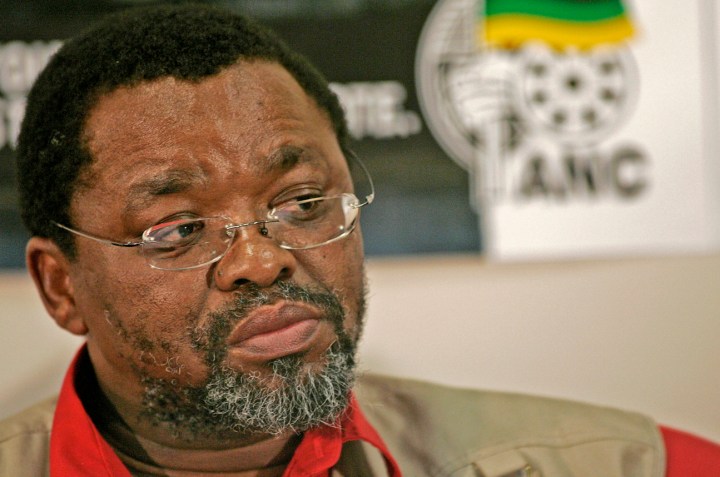It just had to come to this: the ANC is to start judging and classifying journalists. Not that we're surprised. No surprise that our shy and retiring character, STEPHEN GROOTES, has a strong opinion about it. And more questions, of course.
(Note: Because Stephen Grootes is a political, and politicised reporter, he is going to break with convention, and write it in the first person. He feels it’s more honest – Ed).
As political journalists, a large part of our job is to analyse the ANC. The ANC has now decided it should be part of its main job to analyse the media too. A report in Business Day quotes the party’s secretary general Gwede Mantashe as indicating that a private company is involved in the research that drills down into the “individual attitude” of journalists. In other words, they look at names and the coverage underneath that name. And while the story relates primarily to print reporters, other ANC officials have confirmed this analysis encompasses “all media”. Which means this piece is itself going to be classified as “positive”, “negative” or “neutral”. Which category do you think it’ll end up in?
Reporting on politics is to report on contested terrain. Reporting on our politics is to report on highly contested terrain. As a result of our history, you can look at a room of journalists and have a stab at our life stories, possibly even our parents’ backgrounds. And so our histories, prejudices and idiosyncrasies creep into our daily work. Does this make us objective? No. And we shouldn’t claim to be something no human can be. Does it make us unfair? No. Fairness is achievable and measurable. But if you cut me, I do bleed. I am human.
On one level, as a journalist, I come pre-packaged with an ego (he’s not joking – Ed). It strokes that ego like nothing on earth to think that a meeting of the ANC’s full national executive committee, the room where the decisions that matter are really made, revolves around my coverage. A graph showing where my radio report on Malema’s latest outburst included the phrase “expropriation without compensation” and another showing my iMaverick explanation of why the ANC wouldn’t nationalise the mines is something I believe is worthy of deep consideration by the 80 most powerful people in this country. It’s the same reason why some of my tribe have a sneaking hope that the spooks are indeed listening to our phone calls. One of the reasons I’m a journalist is that I love the attention. There, I’ve said it.
But on the other hand, I would get angry to hear people have been indulging in uninformed analysis. It’s like overhearing a group of young interns ripping into your piece about landlords’ rights without thinking for a moment about the economic impact of allowing tenants to stay in a house forever. It’s irritating.
So I have to ask the ANC: how exactly would my coverage be “negative”, “neutral” or “positive”? If, for example, you consider the saga about mine nationalisation to be “negative”, would a straight 30-second radio report on a Malema speech be negative? And would the response from Mantashe, again, a straight 15-second soundbite from Mantashe opposing nationalisation be negative as well? Because it could be argued that it should be a positive. And if whole issues were considered negative, then just running opposition to them would be considered negative, which would be a very shallow analysis indeed.
At the same time, the ANC is – duh – a politicised organisation. So I would presume some in the alliance love my work and some hate it. Jeremy Cronin might think it’s shallow in its Marxist analysis. Trevor Manuel might think I occasionally raise a smile. And then there’s the shifting sands of different issues, my views on people change depending on what they say and do. Thus Zwelinzima Vavi might well love my pieces applauding his attacks on the Protection of State Information Bill. He must hate my economics. Mantashe might approve of my admiration for his political skills, but hate what I have to say about him and the judiciary. And Malema might just print out my pieces for the pleasure of burning them. All of these people are within the ANC, so how you go about putting articles into simplistic categories I simply don’t know.
Where I do worry though, is whether I will be treated differently because of my coverage. So far, I don’t think that has happened. I’m certainly not the rudest journo around (unless frustrated, in which case the phrase “bloody difficult” comes to mind – Ed) and good manners do buy you a certain space. Access to the ANC is political currency to me. Without it, I’m dead; my daily manna would have evaporated. And while I don’t see the ANC banning people from press conferences based on their coverage – just yet – there are more subtle methods of punishing journalists. People can “fall off” email lists for the more important statements, phone calls can be ignored or calls returned after deadlines have passed, that kind of thing.
Having said all that though, if I approach an ANC official or leader face to face, say at a function or after a press conference, they’re already going to have a view of me and my coverage. It will be informal, a sort of gut reaction. They will know me and know what kind of issues I would be interested in, and whether I will be fair to them with whatever answer they give me. So on one level, this kind of analysis is simply formalising much of what they already know. So could it then be truly evil?
Well, it can be hugely damaging. I don’t expect all ANC leaders to read every website, newspaper or listen to every radio station all the time. So they won’t necessarily have deep insights into individual reporters. Should a graph be put in front of them showing that certain journalists are only negative, they could quite easily put their own impressions aside and believe it. Why not, someone has been paid to study this thing and has really looked into it.
So then, the probable net outcome of this analysis by the ANC is simply to worsen the perception of reporters, most likely all reporters, as held by its leaders and officials. And at a time when talking and communicating is becoming more important than ever, particularly in light of the Info Bill, it is likely to be less than unhelpful. It is simply going to make things worse.
And for that conclusion, this story will, no doubt, be judged as “negative”. Sure it’s not objective. But it’s perfectly fair. DM
Photo: REUTERS

















 Become an Insider
Become an Insider